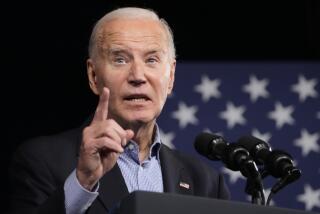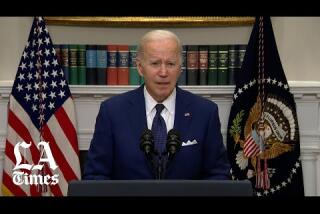Obama reveals conflicted thinking on drone strikes
- Share via
WASHINGTON — At times defensive, solemn, lawyerly and personal, President Obama on Thursday offered a rare glimpse of the burden that the nation’s fight against terrorism has placed on the man who leads it.
In a speech spanning nearly an hour, the former constitutional law professor addressed what is likely to be a central piece of his legacy, weighing what is “effective” and “legal” in warfare against what is “wise or moral.”
Obama acknowledged that drone strikes he has ordered have killed innocent people.
“For me and those in my chain of command, those deaths will haunt us as long as we live, just as we are haunted by the civilian casualties that have occurred throughout conventional fighting in Afghanistan and Iraq,” he said.
At the core of his speech was a detailed case for the continued, if more circumscribed, use of unmanned aircraft: a bullet-pointed defense aimed squarely at liberal critics.
The president not only dealt with critics rhetorically, but he also confronted a prominent one in the audience at National Defense University. Medea Benjamin, the co-founder of the antiwar group Code Pink, interrupted the president’s speech numerous times to shout accusations that have dogged him for years.
“Why was 16-year-old Abdulrahman Awlaki killed? A 16-year-old boy? Why won’t you tell us?” she yelled, invoking the name of one of four Americans the Obama administration acknowledged Wednesday had been killed in drone strikes. Three of them, including Abdulrahman, were slain unintentionally.
Obama’s careful and almost deferential response suggested that he is closely attuned to such complaints. Rather than dismiss Benjamin as a heckler, the president engaged her, asking her to let him explain but also pausing to listen as she continued to talk while security closed in around her.
As Benjamin was escorted out, Obama said, “The voice of that woman is worth paying attention to.”
The exchange was only one of several moments when the president seemed to be considering the evidence and even conceding a point to the other side.
Drones strikes, the president acknowledged, are not “wise or moral in every instance.”
“It was like watching an inner dialogue,” said Heather Hurlburt, executive director of the National Security Network, a think tank focused on defense policy. “What we saw in that was the president arguing with himself a little bit. And I hope we’re all inspired to do that.”
The president’s extensive discussion of his thinking on the issues showed how far the debate has come in the 16 months since he made the first public acknowledgment of the secret missions he had been authorizing for three years. In those remarks, coming in the unlikely venue of a Google+ hangout chat, he offered only cursory assurances and little sense of the heft of the legal and moral questions at stake.
“This thing is kept on a very tight leash,” Obama said then, explaining that the United States does not use drones “willy-nilly” but in a way that avoids more intrusive military actions.
Since then, Obama has been under intense pressure to show that his administration -- and he personally -- is grappling with questions about legal precedent, presidential authority and congressional oversight.
His speech Thursday was his answer to critics and, perhaps, historians.
--
kathleen.hennessey@latimes.com
christi.parsons@latimes.com
More to Read
Get the L.A. Times Politics newsletter
Deeply reported insights into legislation, politics and policy from Sacramento, Washington and beyond. In your inbox twice per week.
You may occasionally receive promotional content from the Los Angeles Times.











